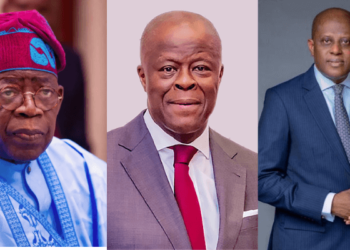The Central Bank of Nigeria (CBN) has denied plans to re-denominate the naira, saying, the statement credited to it on the various social media platforms is fake
According to the bank, while denying on the alleged plan by the Bank to restructure and redenominate the naira on Tuesday, any possible consideration for reforms will be based on laid down procedures and in line with its Act of 2007.
“Whilst the Bank may be considering reforms, such are subject to laid down procedures in line with the provisions of the CBN Act, 2007.
“The public is hereby advised to ignore the news report, as it is speculative and calculated to cause panic in the polity.”
Messages making the rounds on social media platforms such as WhatsApp and Facebook claim that the CBN plans to introduce a new naira policy that will see the naira being redenominated.
According to the message, the redenomination process will take place by dropping two zeros from the currency or moving two decimal places to the left.
The message read, “The name of the national currency will still be the Naira. However, during the transition period, the existing Naira will be referred to as the “Old Naira”, and the new one to be called the “New Naira”. After the transition period, the word “New” may be dropped. For example, the following equivalents will obtain as we re-denominate:
“50 kobo Half kobo; N1 = 1 kobo coin; N2 = 2 kobo coin; N5 = 5 kobo coin; N10 = 10 kobo coin; N20 = 20 kobo coin; N50 = 50 kobo coin or note; N100 = N 1 note; N200 = N2 note; N500 = N5 note; N1,000 = N10 note and the N2,000 = N20 note.”
“The ‘new Naira’ coins and notes will be different from the existing ones i.e. in design, appearance, security features, etc.
“All Naira assets and liabilities (including bank deposits), prices, fees, rents, and contracts (including salaries and wages) will be re-denominated by dropping two zeroes or moving two decimal points to the left.
“During the ‘transition period’ prices will be quoted in both the ‘new Naira’ and the ‘Old Naira’ and everyone will choose whether to pay in the new or old Naira. These five months will be allowed so that everyone will get familiar with the conversion, and it will become self-evident to everyone why he/she would prefer to transact in the ‘new Naira’ rather than the ‘old Naira’. For example, if a bag of garri sells for N2,000 (old Naira), the price in ‘new Naira’ will automatically be N20. The customer will choose to pay either N2000 in old Naira or N20 in the ‘new Naira’. In the supermarkets and formal markets, prices will be displayed in both ‘old’ and ‘new’ Naira. In the informal markets where prices are negotiated, the negotiation could be done in the ‘old Naira’ as usual and converted into the ‘new Naira’ if the customer wishes to pay with the ‘new Naira’.
“This will ensure that prices do not rise due to rounding-up. The five months are also needed for everyone (formal and informal sectors) to become fully familiar with the conversion. It will become obvious to everyone that N50,000 of the ‘old Naira’ has the same purchasing power as N500 of the ‘new Naira’. The question then would be: why carry N50,000 of old Naira when N500 of the new Naira will buy you the same thing?
Consequently, if you have N50,000 in your bank account, it will automatically become N500 in the ‘new Naira’ i.e. if you want to withdraw in the ‘new Naira’ or you can still withdraw N50,000 in ‘old Naira’ during the transition period (January 2024).
“The decision has been taken by the cbn by the directive of President Bola Ahmed Tinubu to reduce the surfering of Nigerians and also slow down inflation.”
However, CBN has debunked the messages in a statement issued by its Director, Corporate Communications, Isa AbdulMumin on Tuesday, October 31, 2023, and said no plans to redenominate the Naira.
The statement reads; “The attention of the Central Bank of Nigeria (CBN) has been drawn to the wide circulation of a text message suggesting that the Bank plans to redenominate the country’s legal tender, the Naira, with effect from January 2024.
“We are concerned that this narrative, which we had refuted before now, appears to be gaining traction with several debates on the implication of such a policy for the Nigerian economy.
“We wish to reiterate that the contents of the message are misleading. The authors of the message, in their mischief, modified text eked from an old policy move by a previous CBN Governor in 2007 to make it appear recent.
For the avoidance of doubt, there is currently no plan by the Bank to restructure and redenominate the naira.
“Whilst the Bank may be considering reforms, such are subject to laid down procedures in line with the provisions of the CBN Act, 2007.
“The public is hereby advised to ignore the news report, as it is speculative and calculated to cause panic in the polity.”










